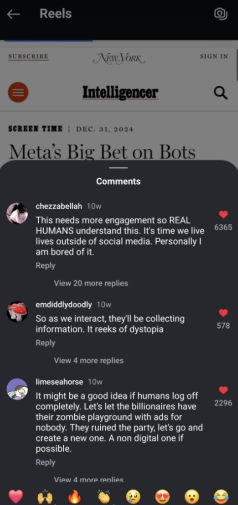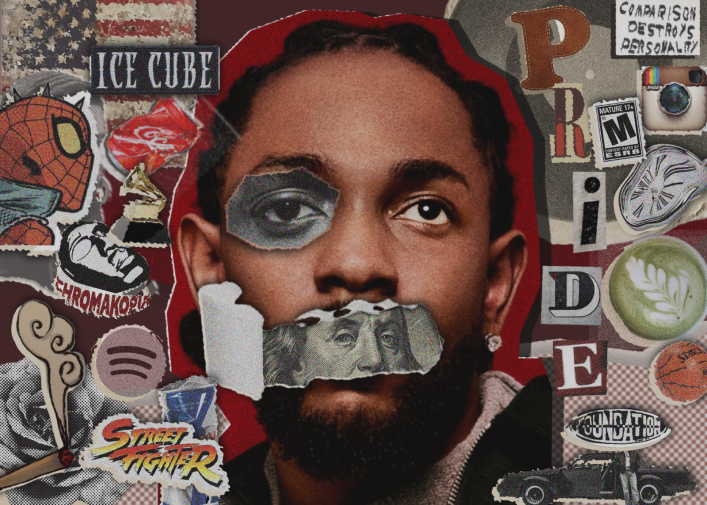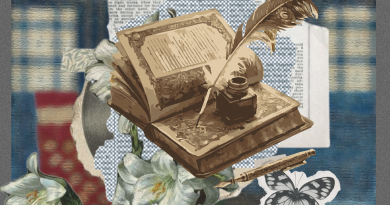Dead internet theory is looking more real than AI part 1
With the fast rise of AI and tech companies pushing the public to interact with it, many users begin to question if the Dead Internet Theory is coming true and its potential impacts.
By: Karla Pastrana
On Sept. 27, 2023 Meta announced that their platforms will feature AI ran accounts where people will see AI characters (bots) interact with the platforms like posting images. The main purpose of this is to get the general public to engage more with AI technology. To help this engagement they published their AI studio to allow users to create their own AI characters. This announcement made many internet users voice their concerns and the fact Meta’s actions were leaning too close to the Dead Internet Theory.
The Dead Internet Theory is a conspiracy theory that is unknown whether it first appeared in 2016 or 2017. The theory first appeared in the anonymous imageboard website known as 4chan. It states that one day the internet will be full of many AI managed accounts that manipulate the algorithm that real people see and interact with, causing people to interact less with real people and more with machines. It states that the purpose is to influence computation patterns and public perception.
Indeed, the community’s thoughts were correct about Meta’s new AI program being the tip of the iceberg of the theory in 2023, because since the announcement the Meta platform has seen hundreds of thousands of AI ran accounts created, better known as bots.
The program gave the green light to AI creators to make accounts for their characters. Many of these characters are those like influencer Aitana Lopez who currently has 357K followers on Instagram who has leaked into other platforms like Fanvue, OnlyFan’s competitor, according to Forbes.
With the floodgate of AI accounts being opened and continues to expand now with AI getting more evolved, users are questioning whether the Dead Internet Theory will become true this year or if it has already but we’re just now noticing. These conversations are mainly seen on Instagram and X, formerly Twitter, where users have noticed an influx of AI accounts. Even major news outlets like The Guardian can no longer turn the blind eye to the fact the theory is coming true.
However, people are only focusing on whether the theory is coming true or not, rather than the potential impacts it could have. This is something we must discuss because right now the common thing people are saying about the theory coming true is that they will leave the platforms because what is the point of having a social media if it isn’t to connect with people.

We can’t forget that the main purpose of Facebook and X was to connect people with friends while also finding new ones, without worrying about the physical barriers that separated people. Due to these bots, these platforms could suffer the price of losing the very users that helped make them into multi-million dollar profits.
The only reason I’m on social media is to connect with people, not machines. If I wanted to connect with AI, I would just go to an AI chatbot. For now, I’m lucky that my feed is full of real people and it’s easy to tell what account is a bot, but who knows how long that will last.
Especially since I’ve been seeing an increase of AI accounts trying to interact with me and I’m not the only one who has experienced this.
“When we first got on social media it was rare to see [bots], but now it’s constant,” said Musician Dusty Gannon of the gothic band Vision Video. “We are on the last stage of real social media.”
Gannon has been experiencing an influx of bots on his band’s feed. From political to pornography bots trying to promote products, propaganda or start fights. This makes it easy for him to identify them, but he can also see that the Dead Internet Theory is not only coming true, but potentially opening the door for society to interact less with each other.
Gannon recalled when he opened his first social media account on Friendster, the system that inspired MySpace. During his time on Friendster, he remembers it was a hipster outlet where many who weren’t into the mainstream would gather to discuss interests in a safe space. He saw social media as a communication system which was helpful during his time in the military. He had no idea back then that social media would become the beast it is now which his band’s Instagram page reflects due to having 199K followers.

His followers find comfort in his and his group’s content and found community. However, the bot apocalypse now threatens their online space. Gannon foresees that the interactions bots have with personal accounts will impact the algorithm’s followers and the owner of the account.
“When you have these bots- they don’t have anything they like, like real people. Their presence scares away the people you want to reach and your own audience. It’s tough because there’s nothing you can really do to control how many bots interact with your account,” Gannon told The Ledger. “I wish these platforms had something that we can use to analyze our followers to identify bots and let’s us remove them so our content can reach our actual audience.”
Gannon isn’t the only creator who sees a negative impact from the increase of bots on social media, as lifelong Artist and Webtoon Comic Creator Troyzworld also sees a negative impact and has witnessed it spreading into less mainstream platforms like Devain Art. Just like on Instagram, Devain Art bots are trying to sell products or obtain money in any way they can.
“AI bots frequently try to convince me that my account will be banned if I don’t click on their link and fill out all my information, or try to convince me to promote their cheap jewelry,” Troy told The Ledger. “When I was a smaller account, often the first (and sometimes only) comment I would receive on my latest art piece would be the request to repost it on some other Instagram page. Luckily, I’m able to recognize most fake artwork and fishy accounts, but they can pose a real threat to anyone.”
The bot takeover on social medias has been a shame for Troy to witness, as it is killing sites like X. Troy recalls when X use to be a platform that uplifted creatives. But now it has become a hostile landscape for creators thanks to AI art, leniency around hate speech and harassment. Due to that, Troy can’t help but think it’s a good thing that pro-AI platforms are dying.
“While my job relies heavily on social media to reach my audience, there’s still a part of me that yearns to return to something simpler, paper-based, and word of mouth. Websites and social media platforms that utilize AI or welcome its content without restriction are collapsing in on themselves, and in their place, new platforms with better policies that protect artists and content creators are rising up in their place,” Troy said.
Some of these new platforms with better AI policies is Bluesky which was created by Twitter’s former head Jack Dorsey. On Nov. 15, 2024 the official Bluesky account on the platform announced that the company will not use artists’ work to train AI. They restated this vow once again on Nov. 26 and that they will ask for user consent if AI testers ask for the platforms to assist the AI training.
This is one of many reasons users have moved over to it, with over 33 million registered users since March. This is a huge jump from the 20 million users it had in November 2024.
Just like Troy, I feel a bit bad at seeing some platforms digging their own graves, but sadly that may be the only way they will understand that not putting restrictions on AI or prioritizing real people over bots isn’t a good idea.
Will I be sad the day I have to say goodbye to those platforms? Yes, because I have made many fond memories with my online friends and been able to find lost friends, along with staying in contact with longtime distant ones. But there are other ways to connect with people who are far from us like on Discord.
The Dead Internet Theory is just a reminder for us to get offline and make real life connections with those around us.
Gannon encourages readers to find community and enjoyment in real life. Attend in-person events like concerts, theatres, conventions and other events. Do human driven things that don’t force you don’t need to question whether it is real. And Troy encourages people to spend time offline to develop hobbies, enjoy nature, studying architecture, listening to music, reading books, watching movies, exercising and building relationships.
“In my personal experience, I have found that the less time I spend online, the more I realize how little it matters. When you are enjoying making art, your skills will naturally develop and your personal style will shine through, allowing you to create something that no AI art can compete with,” Troy said.
It’s time to enter the real world because right now it needs us. If we stay any longer on social media, we may be heading into a dystopian world like in “Blade Runner 2049” in terms of our mental health impact but that’s a topic for part 2 on the Dead Internet Theory.






